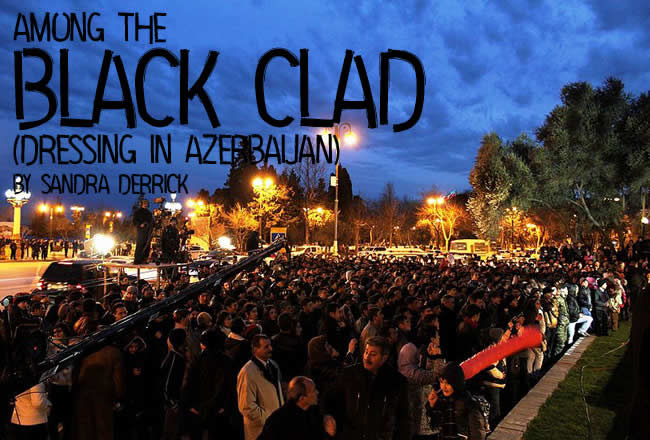
 n September of 2011 I flew from America to Azerbaijan. After some thirty hours of air and layover time, I entered the small airport of Baku, the oil-rich capital, where the first shock to my senses, perhaps because it was foreign to me in such a setting, was cigarette smoke. Men in black jackets and black pants lingered around the carousels while smoking, and enough of them smoked to contrast with the women, who did not smoke. My new roommate had ordered a taxi for me. A driver was supposed to have been there, holding up my name on a piece of paper, but he never showed. After waiting for thirty minutes I decided to wade through the shouting voices of taxi drivers who swarmed around me outside the glass doors of the airport. I shouldn’t have to pay more than twenty Manat, I knew, but the drivers, smelling my foreignness—for I hadn’t yet observed the culture enough to understand that women neither look directly in men’s eyes nor dress for comfort like I had—asked for forty. I haggled down to twenty.
n September of 2011 I flew from America to Azerbaijan. After some thirty hours of air and layover time, I entered the small airport of Baku, the oil-rich capital, where the first shock to my senses, perhaps because it was foreign to me in such a setting, was cigarette smoke. Men in black jackets and black pants lingered around the carousels while smoking, and enough of them smoked to contrast with the women, who did not smoke. My new roommate had ordered a taxi for me. A driver was supposed to have been there, holding up my name on a piece of paper, but he never showed. After waiting for thirty minutes I decided to wade through the shouting voices of taxi drivers who swarmed around me outside the glass doors of the airport. I shouldn’t have to pay more than twenty Manat, I knew, but the drivers, smelling my foreignness—for I hadn’t yet observed the culture enough to understand that women neither look directly in men’s eyes nor dress for comfort like I had—asked for forty. I haggled down to twenty.
My first time seeing Baku, a city well known for its lit buildings and glowing fountains, was at night. My driver, though he had my exact address, had no idea where to go. He kept stopping as we neared the center of the city, waving at pedestrians and shouting to other drivers. We would travel only a few blocks before he brought the car to a halt and jumped out. A forty-minute trip doubled in time with loops and turnarounds. The Azerbaijani way, which shows itself whenever I now ask or give directions, is to use landmarks. Something is always located next to something else, something familiar: a square; a statue of Fuzuli, the famous poet; a theater; or a park named after Heydar Aliyev. In front of my apartment, my driver held my 50 Manat (63 US dollars) in his hand. In Russian he said, “I don’t have change.” I took the bill back, and he suddenly produced my thirty Manat like magic.
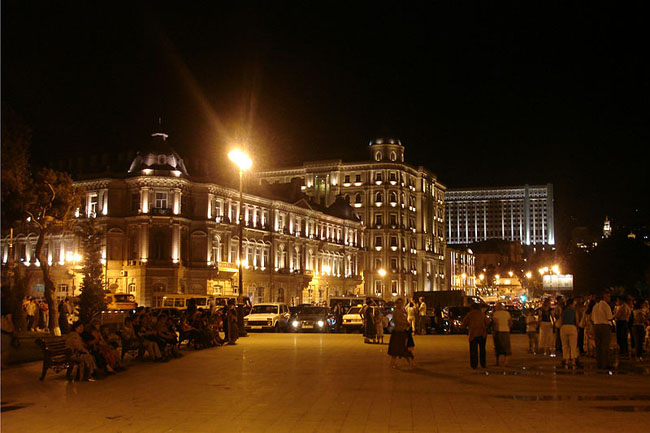
 y first week in Baku, I began using the underground metro. Only blocks from my apartment is Nizami Metro, the most beautiful station, with its mosaic motifs from Nizami’s poems. The escalator takes you deep into the underground, the long descent a Soviet design, and the train ride is slow and typically packed with people, but if you are a woman, a man offers up his seat. As I stood at the tracks waiting for the train my first day of work at the university, a young woman approached me. She spoke to me in Russian, which is what most people guess my ethnicity to be until they hear my dreaded American accent weighted upon Russian words. The woman was dressed in a purple sweater and jacket, though the temperature was at least seventy degrees. “You are from America?” she asked. I am sure I looked foolish. I was smiling, not a common expression here, but she was the first native person to approach me and this filled me with sudden excitement. I told her that I would be teaching academic writing, but as I explained my work, her face took on a desperate expression: eyes narrowed, lips parted. “Why would you come here? Why would you choose Azerbaijan?” she said in English, and I suddenly felt as if she were interviewing me for the position I’d already received, questioning my choice to live and work in Baku for an academic year.
y first week in Baku, I began using the underground metro. Only blocks from my apartment is Nizami Metro, the most beautiful station, with its mosaic motifs from Nizami’s poems. The escalator takes you deep into the underground, the long descent a Soviet design, and the train ride is slow and typically packed with people, but if you are a woman, a man offers up his seat. As I stood at the tracks waiting for the train my first day of work at the university, a young woman approached me. She spoke to me in Russian, which is what most people guess my ethnicity to be until they hear my dreaded American accent weighted upon Russian words. The woman was dressed in a purple sweater and jacket, though the temperature was at least seventy degrees. “You are from America?” she asked. I am sure I looked foolish. I was smiling, not a common expression here, but she was the first native person to approach me and this filled me with sudden excitement. I told her that I would be teaching academic writing, but as I explained my work, her face took on a desperate expression: eyes narrowed, lips parted. “Why would you come here? Why would you choose Azerbaijan?” she said in English, and I suddenly felt as if she were interviewing me for the position I’d already received, questioning my choice to live and work in Baku for an academic year.
We stepped onto the train together. Westerners often say that riding the metro is like attending a funeral—all one sees is black. Westerners are also surprised to see same-sex platonic intimacy in public. Teenage boys on the metro sometimes hold each other around waists and necks like the slow-dance positions of boys and girls in the U.S. Women hold hands and link arms. When the girl took my hand, my body stiffened. As we sat side by side for minutes holding hands, she shouted over the train’s loud spinning wheels, “You must give me your number and email!” She worried for me as though the little I’d so far experienced, none of which was threatening, was a façade, and I needed her protection. I gave her my information, and before she exited, she looked at me as if abandoning me to a dangerous world. In this somber mood, I entered my first day of university.
 fter a month of living in Baku, a mixture of homesickness, culture shock, and an overwhelmingly black-clothed population inspired me to shop. Cheap shopping exists in the underground, a maze of corridors near metro stops or busy intersections with cubicle-like stores as small as three by five feet. I’d first gone to the underground in September, hunting for a knife sharpener, since all the knives in my apartment were dull. Because I’d forgotten my dictionary and exhausted my Russian adjectives, I gestured the motion of cutting, which looked as if I were sawing off my fingers, and finally, at the store owner’s request, drew a picture. The result: no sharpener. My best advice from a visiting friend: Buy a new knife.
fter a month of living in Baku, a mixture of homesickness, culture shock, and an overwhelmingly black-clothed population inspired me to shop. Cheap shopping exists in the underground, a maze of corridors near metro stops or busy intersections with cubicle-like stores as small as three by five feet. I’d first gone to the underground in September, hunting for a knife sharpener, since all the knives in my apartment were dull. Because I’d forgotten my dictionary and exhausted my Russian adjectives, I gestured the motion of cutting, which looked as if I were sawing off my fingers, and finally, at the store owner’s request, drew a picture. The result: no sharpener. My best advice from a visiting friend: Buy a new knife.
From slippers to pant suits, bright clothes are sold underground, but the cheaper clothes tend to have ruffles that suffocate, or fist-sized belt buckles attached to sweaters. The European retail stores are very expensive, but there is almost always something on sale.
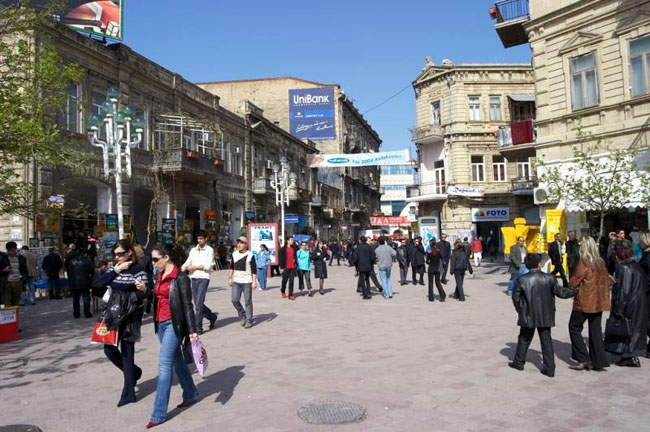
 n December, after teaching my last class of the term in Baku, I jumped on bus 135. I was one of just a few women among a vehicle packed with men wearing black. The bus lurched into speed on a straightway of paved road before turning into the small town of Khirdalan where, due to the two-lane road consumed by three-lane traffic and too frequent bus stops, the driver couldn’t go fast. I thought he must have liked the short length of car-free road best, accelerating with abandon, not yet needing the requisite navigating skills for the chaos of Azerbaijani traffic.
n December, after teaching my last class of the term in Baku, I jumped on bus 135. I was one of just a few women among a vehicle packed with men wearing black. The bus lurched into speed on a straightway of paved road before turning into the small town of Khirdalan where, due to the two-lane road consumed by three-lane traffic and too frequent bus stops, the driver couldn’t go fast. I thought he must have liked the short length of car-free road best, accelerating with abandon, not yet needing the requisite navigating skills for the chaos of Azerbaijani traffic.
An elder tapped his key on a window, an acute clashing of metal on glass, and shouted a now familiar phrase in Azeri: “Saxla!” Normally, after this request, the bus driver breaks without regard to how close the nearest official stop is, but for the first time in my experience, the driver did not make an unscheduled stop. The passenger and bus driver screamed at each other for minutes. Azeri is a Turkic language, but as Azerbaijan is a post-Soviet country, the elders, and some of the youth (though the numbers are diminishing) speak Russian. The man sitting next to me on the bus made a joke in Russian: “If he wanted a personal stop, he should have taken a taxi.” As someone with just a basic understanding of Russian, I rode the excitement of my foreign language comprehension all the way to my next transfer.
From the bus, I walked to the 20th Yanvar metro. Underground, I daily pushed to hold my place in line to add gapiks (change) to my metro card, and once scolded a teenaged boy in Russian who tried to cut. I made a conscious effort to fit in enough to be comfortable, and if I did not push my way on and off the metro, I would have missed many stops by getting shuffled too far to the back, and missed many trains by not forcing my way on. Once, I was reprimanded for pushing. Taken by surprise, I quickly said in Russian, “You study me how to act. What can I do?” I’d confused my verbs. Study and teach have minor differences in Russian. This error, though, is not as significant as my husband’s instructions, delivered in Russian, to his students his first day teaching in Estonia: “Open your asses,” he’d said, instead of folders. Just one vowel off.
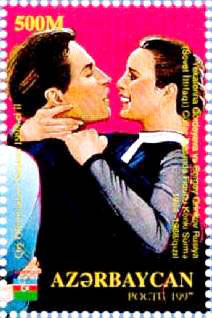
 ne day, I went shopping for a sweater at Mango. Though Azerbaijan has more expensive boutiques than this Spanish clothing company, Mango is still extravagant for the average Azerbaijani. Upon my entrance, four salesgirls exchanged a subtle series of eye contact and nodding as strategic as American football. “Zdrasvuite,” the chosen girl said. I wondered if this girl was the lowest on the totem pole. In my wool coat and Converse sneakers, I looked poor compared to the meticulously dressed, stiletto-heeled Azeri women who normally shopped at such stores. The salesgirl stood so close to me as I moved my hand along the clothes hanging on the racks that I heard her breathing. I was not annoyed, but many foreigners are, and learn a phrase I’ve yet to use: “Pozhaluista ne khodite za mnoi,” which tells the attendant that you don’t want her following you.
ne day, I went shopping for a sweater at Mango. Though Azerbaijan has more expensive boutiques than this Spanish clothing company, Mango is still extravagant for the average Azerbaijani. Upon my entrance, four salesgirls exchanged a subtle series of eye contact and nodding as strategic as American football. “Zdrasvuite,” the chosen girl said. I wondered if this girl was the lowest on the totem pole. In my wool coat and Converse sneakers, I looked poor compared to the meticulously dressed, stiletto-heeled Azeri women who normally shopped at such stores. The salesgirl stood so close to me as I moved my hand along the clothes hanging on the racks that I heard her breathing. I was not annoyed, but many foreigners are, and learn a phrase I’ve yet to use: “Pozhaluista ne khodite za mnoi,” which tells the attendant that you don’t want her following you.
I showed particular interest in a white coat, rubbing the thickness of the material between my fingers, and the girl pulled the coat from the rack and had two more coats off the hanger while I stood in front of a mirror, uncertain of how I’d arrived there. “Red,” she said in Russian, “is sophisticated. Black no good.” The chic appeal of black clothing in America was lost in translation. I rejected the coats, but the girl believed she understood my taste and began running clothes to me as I continued browsing. Tiger print? No. A striped sweater in the colors of the American flag? Uh, no. I took a step back, thinking I should try on a sweater I’d just passed, and landed on the salesgirl’s foot. My purchases to date: two orange sweaters, one green sweater, and a striped scarf of reds, blues and oranges.
 rom the Nizami metro I normally walked home, but the night after my last class I met my Azeri friend at a teahouse. At seven p.m., the purple glow of dusk is saturated by night, and the number of women in the streets significantly decreases. They make their way home, darkening the night twofold, first by the lack of their presence, and second, by its result: a concentrated presence of black-clothed men—black from caps to shoes—who own the city after dusk.
rom the Nizami metro I normally walked home, but the night after my last class I met my Azeri friend at a teahouse. At seven p.m., the purple glow of dusk is saturated by night, and the number of women in the streets significantly decreases. They make their way home, darkening the night twofold, first by the lack of their presence, and second, by its result: a concentrated presence of black-clothed men—black from caps to shoes—who own the city after dusk.
I ordered tea for the two of us. My friend and I had met many times before, and we jumped into serious conversation in minutes. “Do you feel aggression in the streets, a sense of frustration in the youth that is bottled up?” she asked, warming her hands with her teacup, but not lifting it to her lips. With the appearance of anti-government protests in Baku this past spring, students had been told they would be expelled from their universities if they participated in the protests or did not attend classes on days of planned protests. “Yes, I’ve felt some aggression,” I said. I sensed a certain tension my first month, but I attributed that to cultural differences. Yet the tension persisted after I acclimated to life in Baku, and this tension is something I cannot easily define.
My girlfriend barely touched her tea. After a day of teaching, my voice was weak and parched. I poured my third cup, and my girlfriend told me about students who had gathered at Fountain Square in downtown Baku to bring awareness to reading in public (I’ve taken public transportation five times a week while here, but have seen few people reading while on it). The police quickly broke up these students who sat on benches reading books, one of which translates as “A Shop of Ideas.” “Our people have no voice,” she said. “We are far from a democracy. We want change.” I made a mental note of my friend’s outfit as she spoke: a bright red sweater and a green and purple scarf.
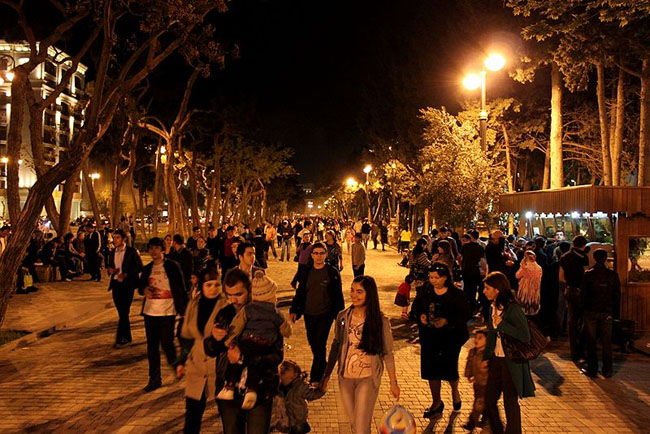
 ertain days I wore my colorful clothing proudly like some American uniform, as though the reds and greens symbolized democracy. Perhaps to Azerbaijanis, though, those colors symbolized the colors of their very own flag. Splashes of color do exist amid the black attire. One of my male students, in his bright yellow shirt, voluntarily—and in isolation—picks up litter each week. After being stopped for suspicious activity in the daytime, he switched to cleaning up his neighborhood after dark.
ertain days I wore my colorful clothing proudly like some American uniform, as though the reds and greens symbolized democracy. Perhaps to Azerbaijanis, though, those colors symbolized the colors of their very own flag. Splashes of color do exist amid the black attire. One of my male students, in his bright yellow shirt, voluntarily—and in isolation—picks up litter each week. After being stopped for suspicious activity in the daytime, he switched to cleaning up his neighborhood after dark.
The clothing purchases I’ve made while here have had little meaning. They have been pacifiers for my cultural adjustments and a change from the tedium of the few choices in my suitcase. For this new generation, in all their love for Azerbaijan, which my students and friends always make sure to speak of—love for their motherland—color is slowly incrementing into expression, a break from their parents’ black-clad generation of a Soviet-ruled era.
I depart in June. Nigar never wrote or called. I haven’t seen her in the metro or walking through the city. Even if she were wearing her purple clothing, I doubt I would recognize her. I have had other brief encounters during which taxi drivers, produce sellers, and students express their negative opinions of their native city with an intensity like that of Nigar. Perhaps they share the same thoughts publicly, but since I don’t know Azerbaijani, I can’t always understand what’s being said in the streets or on the bus. I have thought of their words, though, like secrets. Sandra Derrick is a writer and Fulbright Scholar. These views expressed in this article are not those of the Fulbright program, the US Department of State, or her host country affiliates.
Sandra Derrick is a writer and Fulbright Scholar. These views expressed in this article are not those of the Fulbright program, the US Department of State, or her host country affiliates.


